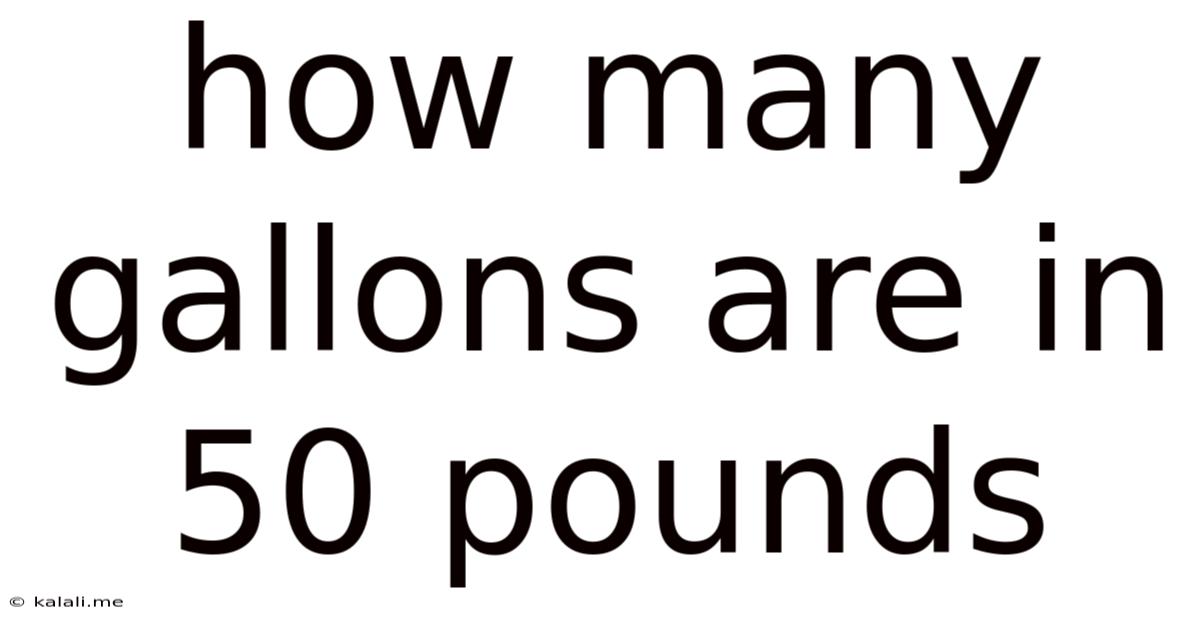How Many Gallons Are In 50 Pounds
Kalali
Jul 13, 2025 · 4 min read

Table of Contents
How Many Gallons Are in 50 Pounds? A Comprehensive Guide to Fluid Weight Conversions
Determining how many gallons are in 50 pounds isn't a simple "plug-and-chug" calculation. The answer depends entirely on what substance you're measuring. This is because different substances have different densities – meaning the weight of a given volume varies significantly. This article will explore this concept in detail, providing you with the tools and knowledge to accurately convert weight to volume for various common liquids. Understanding the relationship between weight, volume, and density is crucial for many applications, from cooking and baking to industrial processes and scientific research.
Understanding the Key Concepts: Weight, Volume, and Density
Before we delve into specific calculations, let's clarify the key terms involved:
-
Weight: This refers to the force of gravity acting on an object's mass. We typically measure weight in pounds (lbs) or kilograms (kg).
-
Volume: This represents the amount of three-dimensional space occupied by a substance. Common units for volume include gallons (gal), liters (L), and cubic feet (ft³).
-
Density: This is the mass of a substance per unit volume. Density is usually expressed in pounds per gallon (lbs/gal), kilograms per liter (kg/L), or grams per cubic centimeter (g/cm³). Density is a crucial factor in weight-to-volume conversions. A denser substance will weigh more for the same volume compared to a less dense substance.
The fundamental relationship between these three concepts is expressed by the formula:
Density = Mass / Volume
Or, rearranged to solve for volume:
Volume = Mass / Density
This formula is the key to solving our initial question: "How many gallons are in 50 pounds?"
Calculating Gallons from Pounds: The Importance of Density
As mentioned earlier, the density of the liquid is critical. Let's examine a few common substances:
-
Water: The density of water is approximately 8.34 pounds per gallon (lbs/gal) at standard temperature and pressure. This is a crucial benchmark in many fluid calculations.
-
Milk: Milk has a slightly higher density than water, typically around 8.6 pounds per gallon.
-
Gasoline: Gasoline is less dense than water, with a density usually around 6.07 pounds per gallon.
-
Oil: The density of oil varies significantly depending on the type of oil (e.g., vegetable oil, motor oil). You'll need to consult a reference source for the specific density of the oil you're working with.
Let's illustrate the calculation using water as an example:
To find out how many gallons are in 50 pounds of water, we'll use the formula:
Volume (gallons) = Mass (pounds) / Density (lbs/gal)
Volume (gallons) = 50 lbs / 8.34 lbs/gal ≈ 5.99 gallons
Therefore, 50 pounds of water is approximately 6 gallons.
Examples with Different Substances:
Let's perform similar calculations for other substances:
- 50 pounds of milk:
Volume (gallons) = 50 lbs / 8.6 lbs/gal ≈ 5.81 gallons
- 50 pounds of gasoline:
Volume (gallons) = 50 lbs / 6.07 lbs/gal ≈ 8.22 gallons
Factors Affecting Density and Conversions:
It's crucial to remember that density can be affected by several factors, including:
-
Temperature: As temperature increases, the density of most liquids decreases (with a few exceptions). This is why precise temperature control is essential in many scientific and industrial applications.
-
Pressure: Increased pressure generally increases the density of a liquid.
-
Composition: The specific composition of a liquid affects its density. For example, different types of oil have different densities. Adding solutes to a liquid can also alter its density.
Practical Applications of Weight-to-Volume Conversions:
Accurate weight-to-volume conversions are crucial in many fields:
-
Cooking and Baking: Recipes often specify ingredients by weight or volume. Understanding density allows for accurate conversions.
-
Chemical Engineering: Precise measurements of liquids are vital in chemical processes, particularly in reactions where stoichiometry plays a critical role.
-
Fuel Management: For instance, knowing the density of gasoline helps determine the volume of fuel in a tank based on its weight.
-
Environmental Science: Density measurements are essential for analyzing water quality and pollutant concentrations.
-
Medical Applications: Density measurements are used in various medical procedures and analyses.
Finding Density Information:
If you need to convert the weight of a liquid to volume, you'll first need to determine its density. Several resources can provide this information:
-
Chemical Handbooks: Comprehensive chemical handbooks often contain extensive tables of density data for various substances.
-
Online Databases: Many online databases provide density information for a wide range of liquids and solids.
-
Material Safety Data Sheets (MSDS): MSDS sheets for chemicals often include density information.
-
Manufacturer Specifications: Manufacturers of specific products often provide detailed specifications, including density.
Conclusion:
Converting 50 pounds to gallons requires knowledge of the substance's density. While 50 pounds of water is approximately 6 gallons, the volume will differ significantly for other substances like gasoline or milk. Understanding the relationships between weight, volume, and density, along with the factors influencing density, is key to accurate conversions and essential across numerous scientific, industrial, and everyday applications. Always consult reliable sources for the specific density of the liquid you're working with to ensure the accuracy of your calculations. Remember to always consider temperature and pressure when dealing with precise measurements.
Latest Posts
Latest Posts
-
Why Did Esther Rolle Always Wear Orange On Good Times
Jul 13, 2025
-
How Much Is 15 Mm In Inches
Jul 13, 2025
-
4 Ounces Of Chocolate Chips In Cups
Jul 13, 2025
-
How Many Gallons Are In 32 Quarts
Jul 13, 2025
-
How Much Is A Qp Of Weed Weight
Jul 13, 2025
Related Post
Thank you for visiting our website which covers about How Many Gallons Are In 50 Pounds . We hope the information provided has been useful to you. Feel free to contact us if you have any questions or need further assistance. See you next time and don't miss to bookmark.